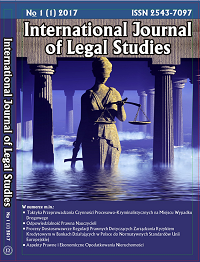Taktyka Przeprowadzania Czynności Procesowo-Kryminalistycznych na Miejscu Wypadku Drogowego
Tactics of Carrying out Forensic-Procedural Activities
at The Scene of Road Accident
Author(s): Małgorzata Maria ŻołnaSubject(s): Criminal Law
Published by: Międzynarodowy Instytut Innowacji "Nauka - Edukacja - Rozwój"
Keywords: Criminalistic tactic;road accident; road accident; judicial authorities;
Summary/Abstract: This year marks the 20th anniversary of the publication of the work of the late Prof. Stanisław Pikulski titled The Basic Problems of the Criminalistic Tactics. Already in the introduction to this textbook, which belongs to the canon of required reading for each criminalistic, the Author has rightly attributed to the forensic tactics a vital role in combating crime, especially in the direct identification of offenders and he has rightly described the knowledge of its rules as necessary to perform criminalistic activities in daily tasks undertaken by the policeman, prosecutor and judge. It seems that following this deliberation one could take one step further and state that also court appointed experts should have the expertise in application of the rules of the criminalistic tactics to correctly fulfill their role of an assistant in legal proceedings. In order to successfully carry out their task, be it a participation in the legal-criminalistic proceedings or preparing an expert opinion, the court appointed expert should closely cooperate in this matter with judicial authorities carrying out the proceedings and vice versa. Training of a policeman, prosecutor and judge to consider and determine the case of traffic offence should comprise the knowledge of methods, which would also lead to an identification of circumstances of vehicles collision, knocking down of a pedestrian. Each stage of proceedings, starting from the first action, which usually is the inspection of the accident scene, followed by the interrogation of witnesses and a suspect (suspects), defining the tasks assigned to the court appointed experts and then their assessment, conducting experiments and lastly determining the type of committed infringement, demands that the judicial authorities not only have the knowledge of the binding provisions of law, but also the know-how to use information about revealed and secured traces.
Journal: International Journal of Legal Studies (IJOLS)
- Issue Year: 1/2017
- Issue No: 1
- Page Range: 9-30
- Page Count: 22
- Language: Polish

